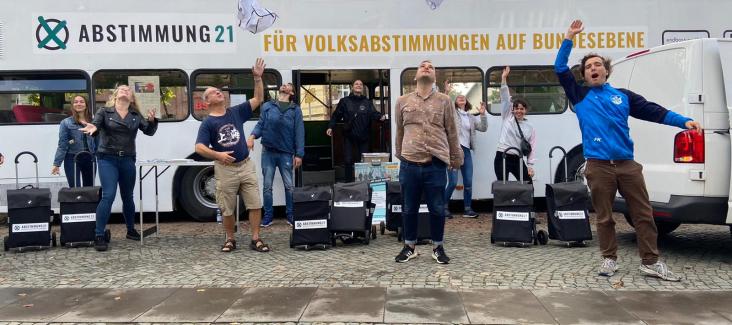The first step in this process was organising a Probeabstimmung (Trial vote) in the Ottensen neighbourhood and Wedel town in the vicinity of Hamburg. From 20-28 August, I was on the ground in Hamburg posting letters and speaking to citizens. The entire handing out process was done by volunteers from around Germany, Europe and the world. By 28 August we had distributed almost 40 000 letters and had reached every household in Ottensen and Wedel. For the trial vote, 8 Political topics were included in the voting papers. These are climate change 1.5°C, 12€ minimum wage, obligatory lobby register, unconditional basic income, donating food instead of wasting, ecological agriculture, no fracking and a nationwide self-organised referendum.
The Omnibus was parked outside of the city hall in Wedel, giving residents a chance to drop by and find out further details about the Abstimmung21 campaign. This was one of the most rewarding elements of the campaign since we were able to enter into a dialogue about direct democracy in a public space (of course keeping 1.5m distance haha). Many residents were tremendously enthusiastic about the initiative, whereas others were more skeptical. We received a host of questions about the specifics of the vote, the funding of the initiative and the end-goal of Abstimmung21 amongst others. All these conversations took place in a very friendly and inclusive manner and demonstrated the benefits of involving citizens directly.
Another fascinating experience was going around the city and posting the letters. On many occasions, I encountered curious residents outside of their homes who wanted to find out more about the campaign. I then had to give them a succinct summary of the campaign and was often asked a series of follow-up questions. Some residents even put me under cross-examination for a couple of minutes in order to gauge whether the campaign was worth their time. Overall, I was encouraged by people’s openness to voice their opinions and the positive way that they engaged with me as a random person handing out letters on their doorsteps. This again shows how strongly German citizens are following debates and the importance of reaching people for socially relevant themes.
The trial vote will be counted by 20 September, after which the campaign will move into the next stage of determining topics for the nationwide self-organised referendum in the first quarter of 2021. Finally, a nationwide self-organised referendum on the issues determined in the aforementioned stages is planned in conjunction with the German federal election in September 2021.

